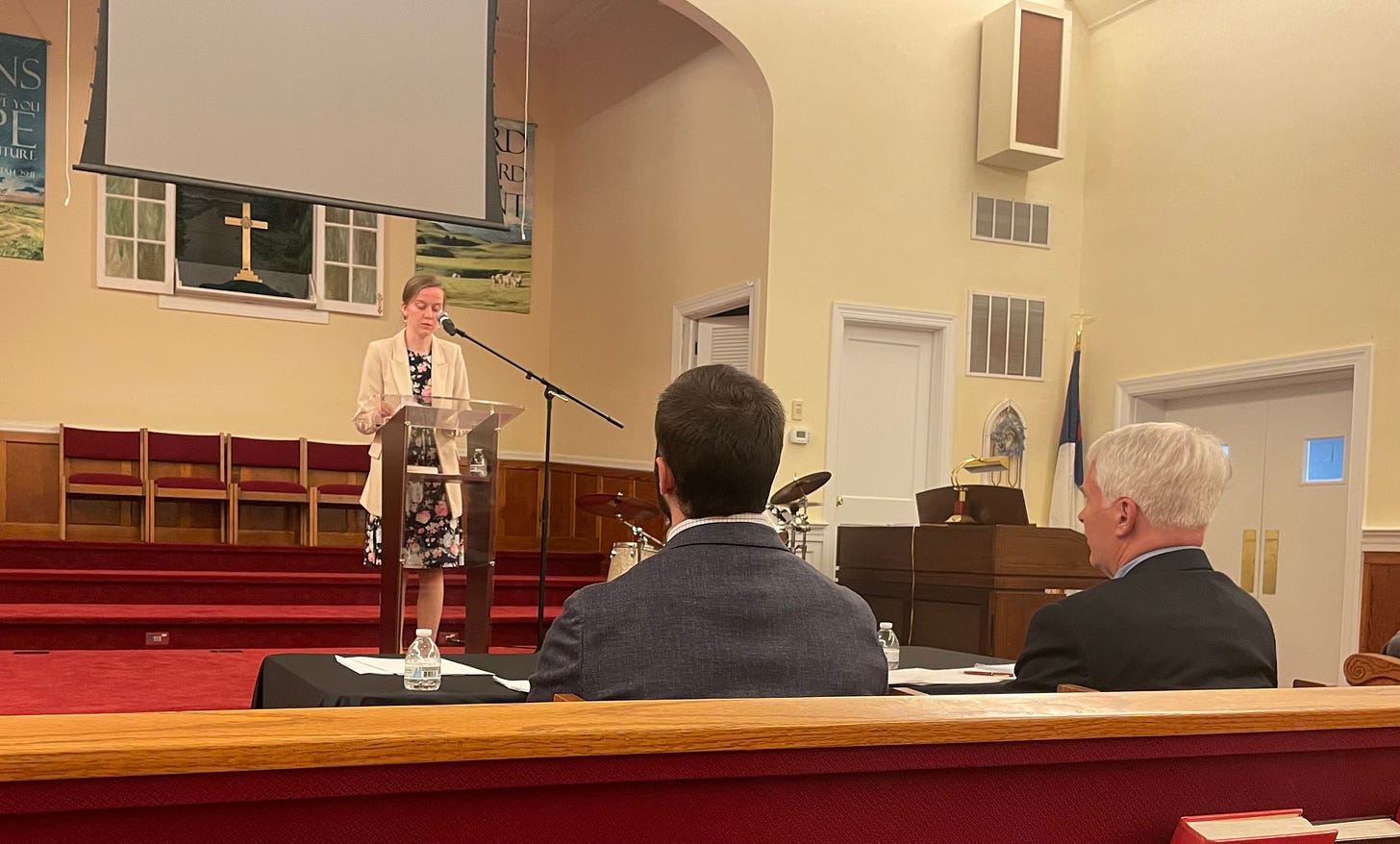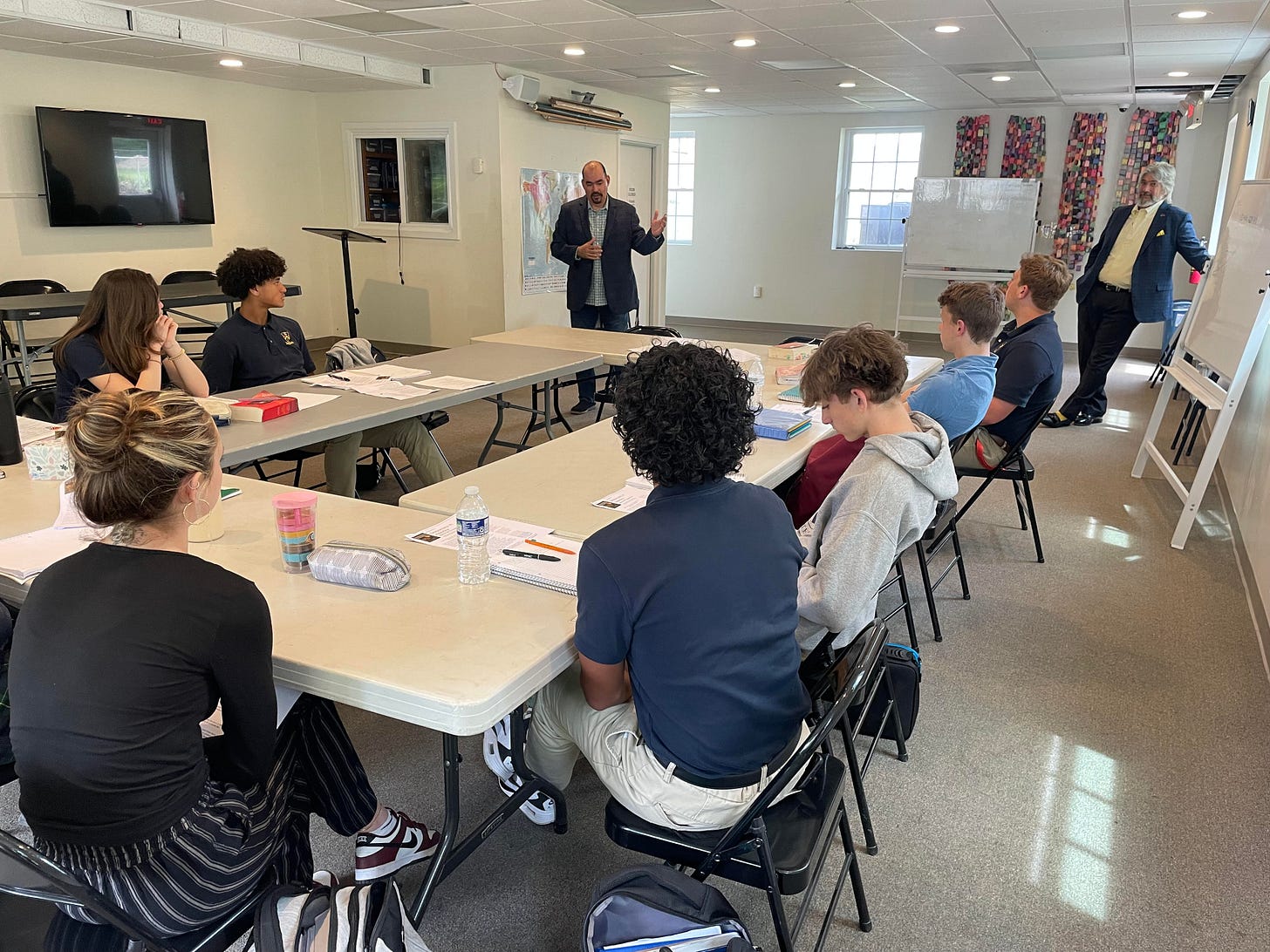Welcome back to A View from The Summit. The Summit Academy is a classical liberal-arts school rooted in the Catholic tradition, located in historic Fredericksburg, Va., serving students in grades 6-12. This newsletter informs readers about our school and the ways in which it is helping renew education and the Church.
I am excited to announce that we have surpassed the 100-subscriber milestone. Our readers are from 22 states. They are lawyers, businessmen, clergy, school leaders and teachers, tradesmen, parents (Summit and non-Summit), and students, united in their passion for educational renewal.
If you are benefitting from this newsletter, please continue sharing it. As a reminder, there will be one more Tuesday newsletter in May, then summer will see occasional new editions of A View from The Summit. The regular bi-monthly schedule will return in September 2024, after our next academic year is underway.
Featured Student Work:
This edition will not involve the normal sections, but will instead highlight recent student work. First and foremost is Field Day. Students went all out for this school-wide event, and the upper-school competitions were all grit: Wrestling, tug-of-war, javelin throwing, chariot-racing . . . and “Try not to laugh.” (Shoutout to Coach Buhle, with whom I won this competition after faculty were made to participate.)
Perhaps the most impressive part of the day was not the completion of the chariot races—taking place rally-style across grueling terrain—but the making and decorating fully functional chariots. Engaged in chariot races, each house competing against the others, students had to devise race plans, pick riders and runners, and execute in front of a large crowd. Here’s a bit of the action:
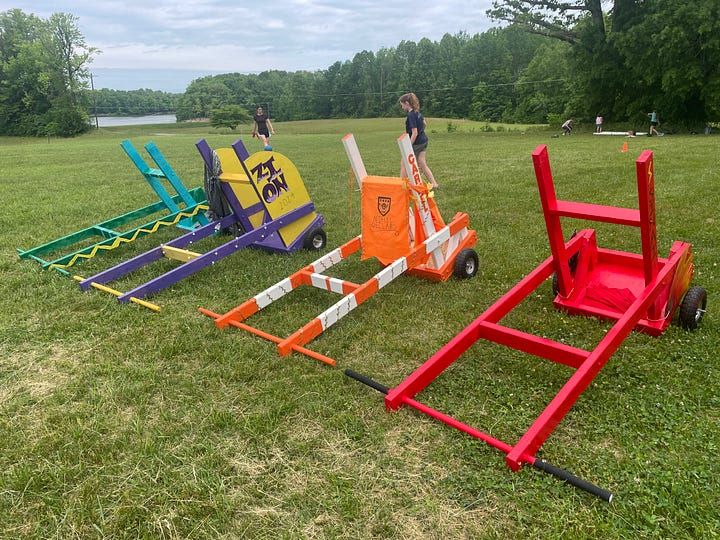
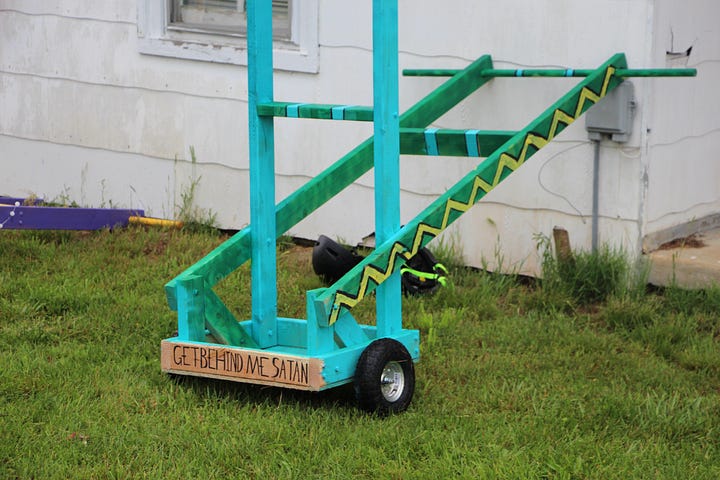
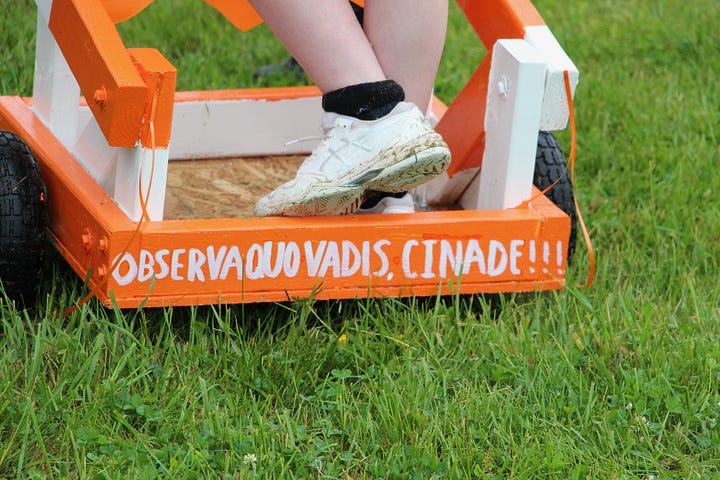
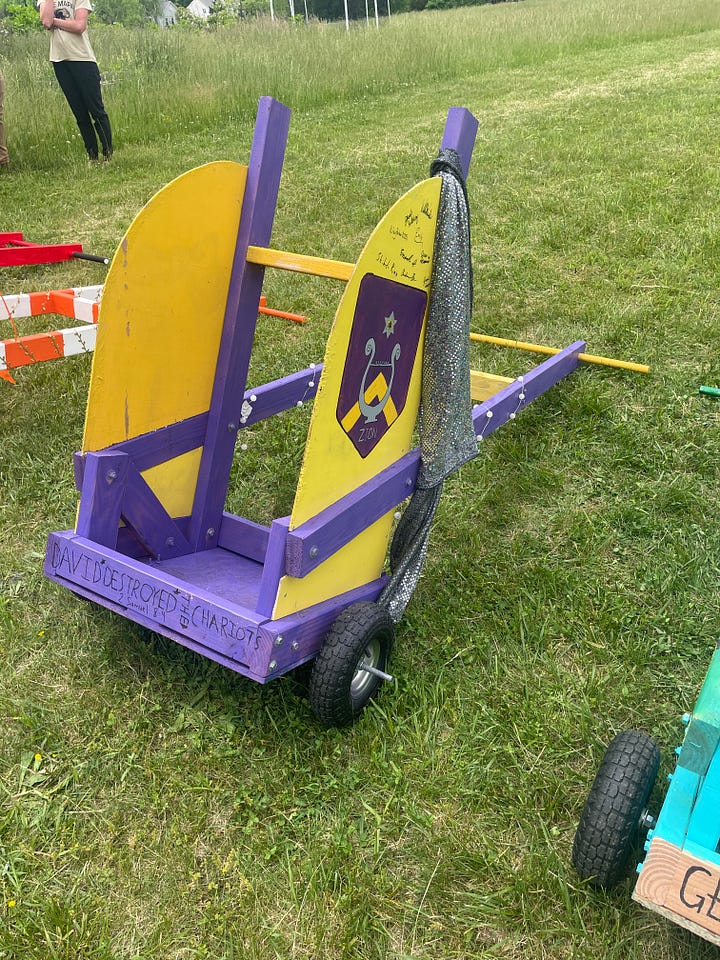
As the year draws to a close, we have seen lots of written work, much of it quite impressive. I’ll present a few of the best examples below. Among our seniors, three finalists competed for the crown last Thursday evening. After presenting their papers, students faced a series of probing questions from our guest judges, Dr. Christopher Riley and Mr. Antonin Scalia.
Riley, who holds a doctorate in aerospace engineering, spent a decade researching for NASA and now develops computational fluid dynamics software. Scalia is a political consultant in Washington, D.C. and worked previously at Palantir, Princeton University’s James Madison Program, and for the U.S. Secretary of Education.
The winning paper is entitled “Gloria Dei Est Homo Vivens: Art, Freedom, and the Way of Beauty in Joseph Cardinal Ratzinger’s The Spirit of the Liturgy.” While an excerpt fails to do the paper justice, the crux of the argument is copied below:
What role, then, does art play in true life and right worship? In the last analysis, art that is true to its nature can ground man’s life in constant worship, leading it towards its fulfillment. Through its truth, goodness, and beauty, worthy art changes man and helps conform his life to the will of God: “Sacred art stands beneath the imperative stated in the second epistle to the Corinthians. Gazing at the Lord, we are ‘changed in his likeness from one degree of glory to another; for this comes from the Lord who is the Spirit’ (3:18).” The gift of sight that authentic art bestows is a sight with which we can perceive Christ and become like Him. And when we follow the eastward path toward the Lord, our lives gradually “orient” themselves around Him. Through true art, our eyes can be opened to the Lord, just as the eyes of the disciples on the road to Emmaus were opened. Then, we can cry out with them: “It is the Lord!” (Jn. 21:7).
[A]uthentic art helps man to see Christ in the liturgy and in life: along the eastward path of the eyes of faith, and along the via pulchritudinis, or “beautiful way” of the eyes of reason, attuned to the logos in things. Art betrays its nature when it rejects Truth, Goodness, and Beauty and loses this inner vision, leaving man imprisoned in empty self-idolatry. By contrast, true art frees man and leads him to live his life well as worship of God. In such art and with such vision, man catches a glimmer not only of Christ, but of who he himself is truly meant to be.
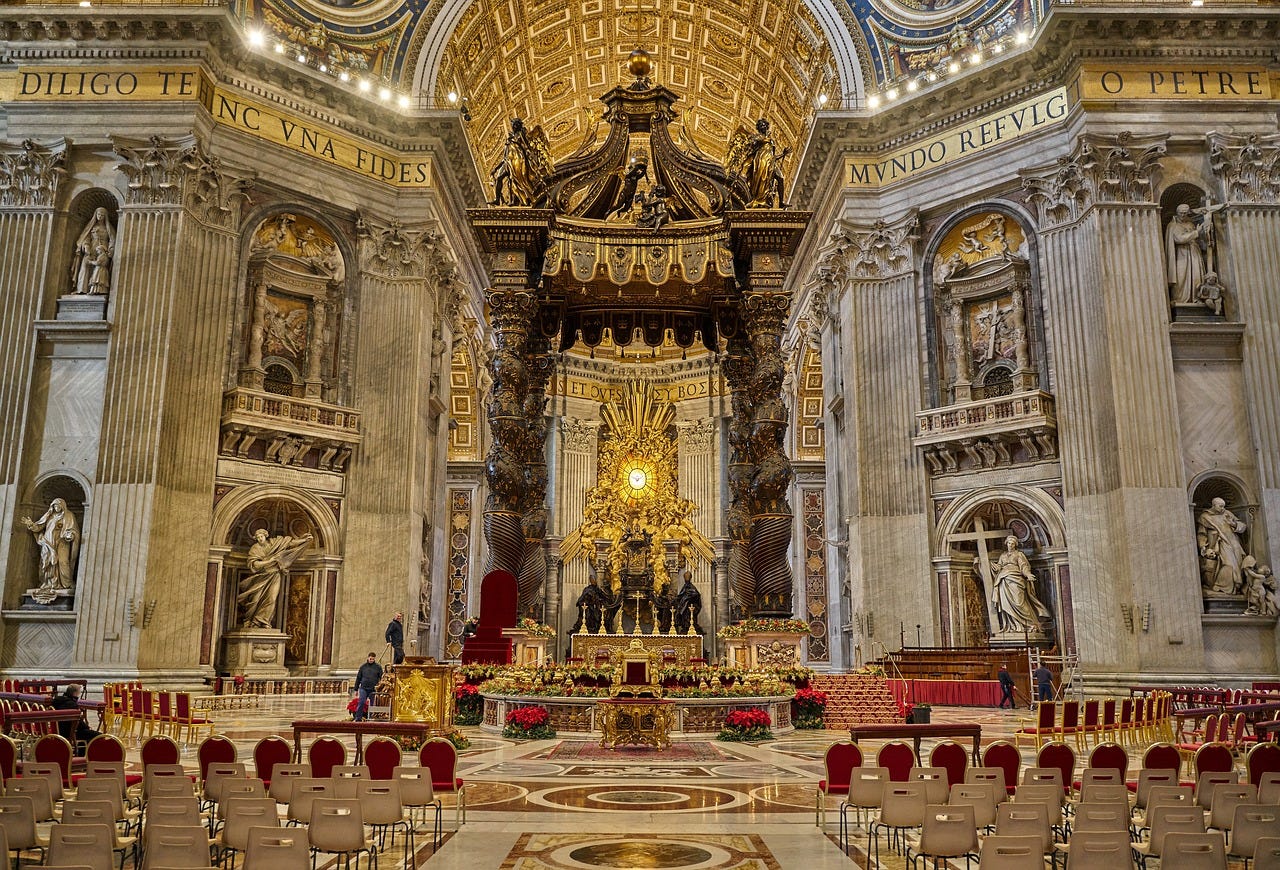
Another series of essays I had the pleasure of reviewing were submitted for our John Paul Asbell Scholarship, a substantial merit-based award to which any student can apply. The scholarship recipient will embody The Summit’s mission and vision in his or her studies, activities, and life. Applicants must write an essay and complete a one-on-one interview.
We received a dozen or so applications for just the one award, and it will be difficult to pick a winner. I want to highlight the introduction of one essay which was especially thoughtful and creative:
A student arrives at his house after a seven-hour school day, and contemplates why he must complete his homework. He thinks to himself, “Why is this homework an essential part of learning? I just spent all day learning and I want to be free in my own home.” This student does not even know why wants to be free because he has not yet realized that he is searching for fulfillment. This student does not know that freedom is not a state of having no responsibilities, but a process involving proper education and self-discipline. So that he can understand how it promotes freedom by showing the path to fulfillment, the student has to know what a proper education is. I was once that student. Through my curriculum studies at The Summit Academy, I have learned that a good education is one that communicates the liberating truth of human nature in its relation to God.
The process of education to freedom is a step-by-step journey in which man is educated about his nature. By the learning and the knowledge he attains he will be able to understand the difference between good and bad and how it can affect his nature. This knowledge will affect the way he sees himself and all things. That, in and of itself, will begin to determine his future by the choices he will make because of the knowledge he has attained. Through the understanding of what is good for his nature he can build good habits to obtain that good. This good will ultimately result in fulfillment, thus satisfying the void that he began with. I have chosen one soul from each part of Dante’s Divine Comedy that I believe best embodies examples of this educational process.
The essay, by the way, delivers on this promise, walking the readers through the journey of education as self-knowledge using Dante as his guide.
From my classroom
Last Friday, my class welcomed two major donors from the surrounding Northern Virginia area. Each spoke about his professional background, his approach to charitable giving, and his reasons for supporting our school. One shared the story of how his wife was able to attend Catholic school thanks to the generosity of an anonymous parishioner, and they have committed to doing the same. The other shared his vision of excellence—how people are attracted to excellence—and explained how he saw that spirit working at The Summit. They counseled students to make sure to save money first and develop the habit of giving ten percent, no matter their income levels. This advice reinforced lessons we have covered.
Students also had to submit a final paper to complete the course, reflecting on what they learned, three financial habits they want to acquire before graduating, and how they will do so. I’m sharing a thoughtful excerpt from one of the papers below:
As I continue on my journey of choosing my career and handling my money, I will be keeping the lessons this class has taught close to me. I have become a lot more aware of every dollar I spend and how that equates to the labor and my own time put into it. As I’m contemplating my future, I will continue to keep in mind the worth of my time and of knowledge, and the worth of the money I make. I plan to invest and find nonprofit organizations that I believer in. The knowledge of money and careers that I have gained is essential for those not only planning their futures, but also those currently running businesses because where money is, there can be chaos, but there is always the opportunity for greater good.
What I’m Reading Now:
This Public Discourse interview with Tim Carney, a highly regarded author and journalist, is well worth a read (as is his new book of a similar title): What Makes America Family Unfriendly? A Q&A with Tim Carney. As part of our effort to renew speaking forum events each semester, we will be hosting Mr. Carney for a fall semester book discussion. Stay tuned for more details.
I am trying to revisit Butler’s Lives of the Saints on a nightly basis. Last night I read the story of Robert Bellarmine, who was declared to have no contemporary equal among the theologians of the Church. Through reading simple accounts of great lives, we learn there is so much richness and beauty available to us, and we learn how full of purity, humility, charity, and joy were the lives of the saints.
If you are enjoying this newsletter, please consider subscribing via the button above and sending it along to others who might be interested. Revenue from paid subscriptions will support The Summit Academy of Central Virginia.




